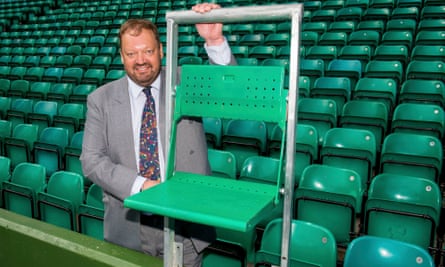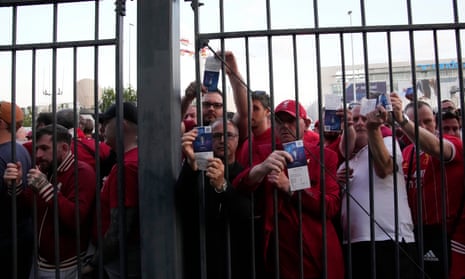Serious concerns were raised about Uefa’s safety and security department earlier this year when an English safety expert with decades of experience quit his role as a consultant for European football’s governing body.
Steve Frosdick, originally a Metropolitan police officer, has dedicated his career to stadium safety in British and European football since the 1990s and has multiple advanced professional qualifications. He resigned from his Uefa consultancy in February, after 11 years in which he was employed to enhance its expertise, incident monitoring, and development and training programmes.
He is said to have become seriously unhappy with the direction of the department which since last year has been headed by Zeljko Pavlica, a close friend of the Uefa president, Aleksandr Ceferin. Frosdick is said to have believed that Uefa’s professionalism, expertise and development were being undermined, and he rejected a proposal to revise his contract, that would have downgraded his role.
Frosdick’s resignation and criticisms came less than four months before serious safety problems beset Uefa’s two end-of-season showpiece events: the Europa League final, where Rangers fans complained there was no water in the heat of Seville, and the horrific chaos suffered by Liverpool and Real Madrid supporters at the Champions League final in Paris.
The revelation of Frosdick’s departure will add to growing concerns about Uefa’s safety operation, and perceived cronyism in the appointment of Pavlica, which Uefa rejects. The Liverpool supporters’ trust Spirit of Shankly, which is representing fans who suffered the excessive delays, police brutality and violent attacks in Paris yet were officially blamed by Uefa for the problems, has renewed its calls for a fully independent inquiry.
The safety and security department has a responsibility for the safe running of Uefa’s matches including finals, and has a leading role in efforts to strengthen good safety practices across European football. Pavlica, a former top-ranking security officer in his native Slovenia, was appointed to head the department last year after the retirement in February 2021 of the previous head of department for four years, Kenny Scott. A 30-year career officer with Strathclyde police up to the rank of chief superintendent, Scott was then head of security at Rangers from 2007 to 2010 and joined Uefa full-time in 2017.
Quick GuideHow do I sign up for sport breaking news alerts?
Show
- Download the Guardian app from the iOS App Store on iPhone or the Google Play store on Android by searching for 'The Guardian'.
- If you already have the Guardian app, make sure you’re on the most recent version.
- In the Guardian app, tap the Menu button at the bottom right, then go to Settings (the gear icon), then Notifications.
- Turn on sport notifications.
Ceferin, a lawyer in Slovenia, and Pavlica, a former senior security officer for Janez Drnovsek when he was president of Yugoslavia and Slovenia, are said to have been friends for decades. Ceferin was best man at Pavlica’s 2018 wedding to Brigita, a former Olympic athlete representing Slovenia. Shortly after Ceferin won the election to become president of Slovenia’s football association in 2011, Pavlica was given his first job in football, working for the association as a safety and security officer.
Uefa has denied cronyism in his promotion to head its safety and security department, stressing that Pavlica stepped up from Slovenian national football to working for the Europe-wide confederation in 2014. That was an external, part-time role. Two months after Ceferin won the election to become Uefa president in September 2016, Pavlica was promoted to a permanent role at Uefa, as a security adviser.
A Uefa spokesperson said that Pavlica “is a well-respected name in the security business” and in football, and “had an excellent safety and security record with the Slovenian national team and served Uefa very well for more than eight years”. He was considered the “natural successor” to head the department, the spokesperson said, having worked alongside Scott, including on Uefa’s club and national team competitions.
The head of department vacancy was not externally advertised, nor was a benchmarking assessment carried out of Pavlica’s suitability for the very senior European safety role. The spokesperson explained that Uefa can make direct appointments when there is “an obvious solution internally”, that Pavlica’s promotion was part of “succession plans” and external assessments are not mandatory in Uefa regulations.

Frosdick was substantially involved as a consultant in Uefa’s training and development programmes and its incident monitoring system, which sought to learn detailed lessons from matches where safety had been put at risk and improve best practice. He is understood to have been invited to make a farewell presentation in a video meeting to Uefa colleagues on 18 February, and is said to have outlined criticisms, including alleging a decline in professionalism. Frosdick declined to comment.
Uefa argues that its expertise has improved since Pavlica’s appointment, not been undermined, saying it has hired proven safety and security experts, continued with training programmes despite the pandemic, and is working to improve incident monitoring. However the spokesperson confirmed that its stadium and security strategy programme, which ran from 2017, had not yet been renewed since it finished last year. Uefa’s description of the 2017–21 programme, which is still on its website, stated that it “drives Uefa’s efforts to keep ahead of the risks and incidents”.
Asked why the programme was not currently running, the spokesperson said it had been impossible to implement a new strategy because of the pandemic: “The next edition of the programme is currently under development and subject to approval by the Uefa stadia and safety committee at one of their next meetings.”
Joe Blott, the Spirit of Shankly chair, emphasised the demand for a fully independent investigation, amid questions, also asked directly by Liverpool, about the independence of the review Uefa announced two days after the final. Uefa appointed as chair the Portuguese politician Tiago Brandão Rodrigues, who has worked closely with Tiago Craveiro, a former chief executive of the Portuguese Football Federation, who is a senior adviser to Ceferin at Uefa.
“Liverpool supporters suffered horrendous experiences in Paris, and we are outraged that Uefa instantly, falsely put the blame on us,” Blott said. “It is now truly disturbing to learn of questions about cronyism, professionalism and the culture in Uefa’s safety department, and we need a fully independent investigation, including into Uefa itself and its running of matches.”
To questions about the events in Paris, specifically the apparently negative perception of Liverpool supporters as troublemakers in advance of the match, Uefa’s spokesperson said: “Due to the ongoing independent investigation, Uefa will not be commenting or disclosing any details on the matter for the time being.”
